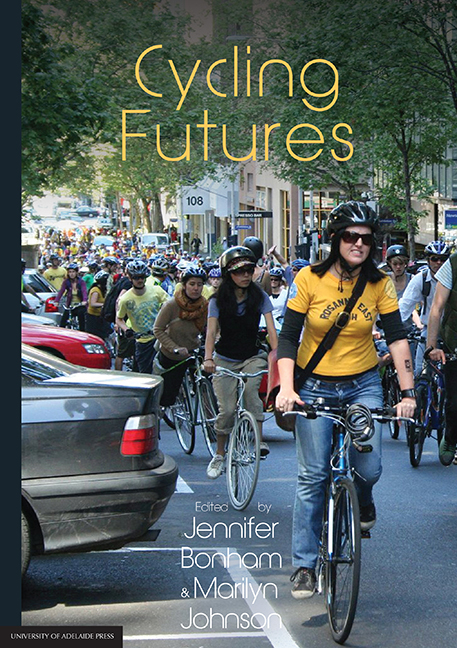Book contents
- Frontmatter
- Contents
- Preface
- Editors
- Contributors
- PART I Current challenges
- PART II Strategies for change
- 9 Gender and cycling: Gendering cycling subjects and forming bikes, practices and spaces as gendered objects
- 10 Making (up) the child cyclist: Bike Ed in South Australia
- 11 More than a message: Producing cyclists through public safety advertising campaigns
- 12 Spaces for cycling
- 13 Off-road cycling infrastructure
- 14 Teaching Australian civil engineers about cycling
- 15 What should planners know about cycling?
- 16 Skilling landscape architects and urban designers for design of bicycle parking and network facilities
- 17 Cycling and Australian law
9 - Gender and cycling: Gendering cycling subjects and forming bikes, practices and spaces as gendered objects
from PART II - Strategies for change
Published online by Cambridge University Press: 25 July 2017
- Frontmatter
- Contents
- Preface
- Editors
- Contributors
- PART I Current challenges
- PART II Strategies for change
- 9 Gender and cycling: Gendering cycling subjects and forming bikes, practices and spaces as gendered objects
- 10 Making (up) the child cyclist: Bike Ed in South Australia
- 11 More than a message: Producing cyclists through public safety advertising campaigns
- 12 Spaces for cycling
- 13 Off-road cycling infrastructure
- 14 Teaching Australian civil engineers about cycling
- 15 What should planners know about cycling?
- 16 Skilling landscape architects and urban designers for design of bicycle parking and network facilities
- 17 Cycling and Australian law
Summary
Introduction
The landmark decision by the New South Wales Court of Appeal in the case of Norrie v NSW to recognise the right of Norrie to register as sex ‘non-specific’ on a birth certificate serves as a caution to researchers, policy makers, planners — in fact the entire community — to remain sceptical of sex as an essential biological fact, and of gender as the culturally produced meanings which proceed from that fact. Both biological sex and gender are social productions (Gatens, 1983; Butler, 1990). Differentiating bodies by reference to anatomical (hormonal, physiological) features is not a self-evident or necessary way of ordering existence. As Bacchi notes:
if indeed ‘boys’ were boys and ‘girls’ were girls, there would not be the amount of disquiet generated by attempts to challenge gender-specific hairstyling (long hair for boys and short hair for girls), or attempts to challenge dress codes. (1996, p. 4)
‘Women’ and ‘men’ are political, rather than natural, categories which have significant consequences for those who do not fit such categories (Bacchi, 1996, p. 4).
So what does this have to do with cycling? It provides an important opportunity to question assumptions about the relation between gender categories and cycling. This questioning has two aspects. First, thinking about ‘women’ and ‘men’ as socially produced categories allows us to challenge the content of those categories and, more importantly, explore the processes by which they are formed. In this chapter we have used the term ‘gendering’ to refer to these processes of gender formation. As Bacchi puts it:
[g]endering describes an ongoing and always incomplete process that constitutes (makes come into existence) (Jones, 1997, p. 265) ‘women’ and ‘men’ as specific kinds of unequal political subjects. (2012, p. 1, emphasis in the original)
The second aspect of this questioning concerns the formation of some ‘entity’ — in this instance, cycling (bikes, practices, spaces) by reference to ‘attributes’ differentiated as belonging to ‘woman’ or ‘man’ (Bacchi, 2012, p. 5). For example, cycling jerseys are formed as women's or men's jerseys by reference to physical ‘attributes’ differentiated as belonging to ‘women’ and ‘men’. As particular associations stick, such as women's jerseys and men's jerseys, they operate to reinforce the categories of ‘woman’ and ‘man’ (see also Faulkner, 2001, pp. 82-84).
- Type
- Chapter
- Information
- Cycling Futures , pp. 179 - 202Publisher: The University of Adelaide PressPrint publication year: 2015



